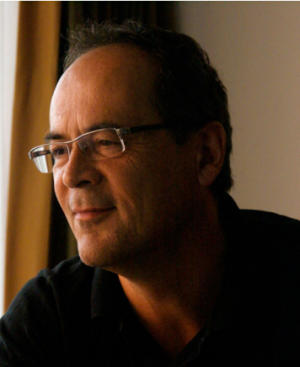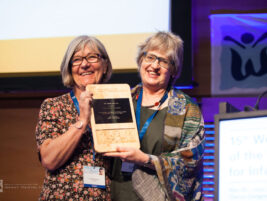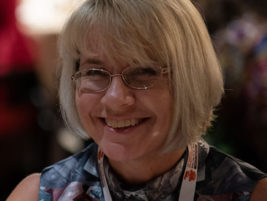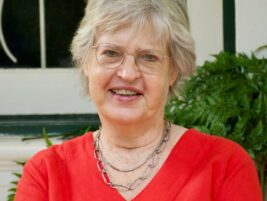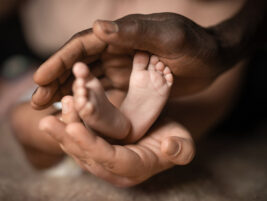Yokohama and the 11th WAIMH congress: What a treat! This congress, perhaps one of the best we have ever organized, has brought together 2000 people in the Yokohama Pacifico Conference Center! And, participants have stayed here working and exchanging information for five full days in a very special ambiance provided by the Japanese way of greeting, of taking care, of Amae, with the ability to attend to every detail with grace. Although I would like to give a full account of the congress, I will just draw attention to a few highlight. Hisako Watanabe and her team, including Yoko Hashimoto, Maruko Iwayama, Haruko Watanabe Choosakul, and Noriko Dalrymple , along with Hiram Fitzgerald and the Program Committee have demonstrated that a WAIMH congress could generate over 2000 participants, and that Japan, always present in WAIMH conferences, has a very lively mental life about infants and parents.
Hiram Fitzgerald has provided WAIMH with an expertise on how to deal with the complexity of a world congress and to make it a place of meeting and exchanges, within a given culture and for that among many other contributions he has deserved the right to stand among our Honorary Presidents.
In this congress people have stayed till the end, participating not only in plenary sessions to hear speakers such as Berry Brazeton and Peter Fonagy, but also to attend sessions detailing infant mental health initiatives throughout Asia:, in Sumatra, in Thailand, so severely struck by the Tsunami; in Vietnam, in Indonesia and in China. We now can envision hold a congress in China in the coming years!. We have been pleased to honor the work of Professor Takeo Doi, who brought the Amae concept to us, and to great him even if in a video. We have been charmed by Wakako Sanefugi, recipient of the new investigator research award for her work on autism at Kyushu University. And it was good to see Campbell Paul and Brigid Jordan awarded for their liaison work at the Royal hospital in Melbourne, for their activities with the Australian Aboriginals, and for advancing infant mental health throughout Australia.
The main feature of the congress for me was the exceptional level of the clinical presentations, regardless of whether they appeared in posters, teach ins, master classes, workshops or interfaces. Interface presentations, launched and directed by Elisabeth Fivaz have proven to be the best place to confront different points of view about the content of video-presented vignettes. Such discourse reflects the very essence of WAIMH. We had a great presentation from Matthew Melmed, Executive Director of Zero To Three, who told us how to anchor our agenda in presentations to policy makers in terms of national values. We had an provocative pre congress institute with Arnold Sameroff , who made a brilliant lecture on risk and resiliency; David Olds, who focused on the characteristics of effective prevention programs; and Daniel Stern, who once again went against the main stream and reminded us that case studies still can provide us with deep insight into relationship issues. This idea will be followed up in a special issue of the IMHJ.
WAIMH is very special. WAIMH comprises the world’s greatest group of experts in clinical expertise on infant mental health. It is the only truly multidisciplinary association on infant mental health that I know of, keeping together different theoretical frameworks- psychoanalytical, attachment oriented, systemic, behavioral; WAIMH is prevention oriented and has probably the largest expertise on clinical programs in infancy. This unique expertise has to be valued and used more by policy makers. We have to learn how we can have greater impact on social policies, how we can be more engaged as experts, making our expertise available, and learning more how we can “speak for the babies.”
WAIMH is in good shape, with a strong impetus towards more international development, towards reaching more countries and cultures, and having stronger linkages between affiliate and WAIMH central office. Now the central office will move to Finland. Tampere University will provide WAIMH with excellent office conditions, the same kind of attention which was provided for 16 years at Michigan State University in East Lansing. Palvi Kaukonnen and Kaija Puura will lead the office functions from Tampere, with the help of Minna Sorsa, who will follow on the work of Tina Houghton and Dolores Fitzgerald , whom we thank for their work and dedication to WAIMH.
Tuula Tamminen, our past president, was essential in providing WAIMH with a secure base in Europe, in organizing top Executive Committee meetings with no costs to the organization, in bringing to WAIMH a special Finnish flavor of discussing hot topics, bringing emotion and organizing things the Finnish way, gently and efficiently. In the Executive Committee meetings in Tokyo, held just prior to the Yokohama Congress, Miri Keren was elected to the office of president elect and named executive at large. She is well known in WAIMH and in Israel and France. She is a child psychiatrist who runs an infancy clinic in Petah Tikva, a suburb of Tel Aviv. She is an exceptionally gifted clinician, with a psychodynamic and clinical research training, both in France and in the United States, and she is also a clinical researcher, having worked with Sam Tyano and Ruth Feldman on classifications issues, on feeding disorders, and on adoption, among others. She will organize a regional congress in Tel Aviv in 2009, during which the current board and the new members of the board and EC will meet and work. In between, the WAIMH board will continue to do its work.
With such a dream team as a board and EC, we will continue to achieve our major goals: WAIMH is an original structure, with emphasis on clinical aspects of infant mental health: programs for infant and families, preventive or treatment, based on science: how to design them, assess them and teach them; of course we are very interested in advances in the understanding of early development, which still stands as one of the major remaining mysteries in science. We know that development is articulated through different pathways, that the same conditions may lead to different outcomes, and different conditions may lead to the same outcomes, processes which Von Bertallanfly has named equifinality and multifinality.
This is what we want to understand more: what leads to what under which circumstances, what helps promote resiliency, and what are the ingredients of the fascinating interplay between genes and environment. This is why we are so much interested in cultural differences, and in the way they shape psychopathology and therefore guide our ways of intervention.
This is why we are interested in knowing how people do elsewhere, how they care for young children, how they help young parents become caregivers, how they understand and treat difficulties in development. And this is why we are interested in the transcultural validity of our assessment tools and classification systems.
These issues will underlie our efforts to write a Declaration of the Rights of the Infant, which will be written under the auspices of a task group with Bob Emde and circulated within the affiliates. Another major goal is to keep track of key figures and practices in the history of infant mental health and parenting.
So what we have to put forward is a large set of issues: we have to put into place an implementation plan based on our new bylaws, assessing what impact they will have on our organizational structure and function. The changes in the bylaws were made to increase the input of affiliate societies into the program committees of congresses and into the EC. Now we have to know what the affiliates feel about WAIMH, and what they expect from it and we plan to launch a survey about this with the affiliates. We also have to find ways to increase our membership, to increase our influence, to increase our ability to give research and clinical grants and to help affiliates from developing countries join WAIMH and bring their expertise and knowledge into the conversation about infant mental health.
And so, when we meet in Leipzig, in 2012, we can assess the extent to which our goals have been realized. Kai von Klitzling and Karl Heinz along with German, Austrian and Swiss colleagues from the GAIMH are preparing a very special congress, in a city at the heart of changes in Germany, in the birthplace of Bach, living place of Leibnitz and of the founder of the field of psychology, Wilhelm Wundt. So this will be a place to think about early development and developmental psychology. Always a city on the forefront of the move, connected to the world through the famous fairs, Leipzig will be a great place to discuss the effects of social and political changes on parents and infants, and to discuss the basis of developmental changes. After Leipzig, we will move to Cape Town, in South Africa, with Astrid Berg and Mark Tomlinson organizing the 2012 world congress. After that, the game is open, Edinburgh, Tel Aviv or elsewhere, but having those bids already now is a good sign of our health. And last but not least, let me tell you how proud and happy I am to be the new president of WAIMH and how much I look forward to working with the board and all of the affiliate associations.
Vol. 16 No. 3 Fall 2008 – President’s Perspective: “WAIMH Comes of Ages”
Authors
Guédeney, Antoine,
President of WAIMH
France


